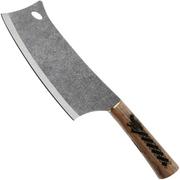

You have an outdated webbrowser. The website might not work correctly.
A cleaver is a large and heavy knife used for chopping and slicing meat, poultry, fish and vegetables. Need to cut through bones or separate spare ribs? In that case, grab your cleaver. In addition, you can use the knife to chop through hard vegetables. A cleaver should be your go-to knife for any chopping task.
When you first pick up the knife, you'll immediately notice the weight. Cleavers are far from lightweight. Their weight is on purpose: it adds the necessary forge and momentum to cleave ingredients. Because of the size and weight of a cleaver, it is important to know how to safely use this knife. Use the correct cutting techniques and only use the knife for its intended purpose; chopping and cutting ingredients like meat, bones and vegetables. The high blade with a straight or slightly curved edge provides stability and control during chopping.
The length of the chopping blade (15-30 cm) allows cutting through large pieces of meat, bones and vegetables with one powerful movement. The sharpening angle of a cleaver is slightly bigger and less thin than a chef's knife’s. This makes chopping meat and bones easier. A meat cleaver knife has a sturdy handle, so you can keep a firm grip on it when you're chopping. This is important to ensure safety during chopping and slicing.
It is important to maintain a cleaver properly to maximise its lifespan. You can do this by cleaning the knife by hand after each use, sharpening regularly to ensure the blade stays sharp, storing it properly and using the knife safely and correctly.